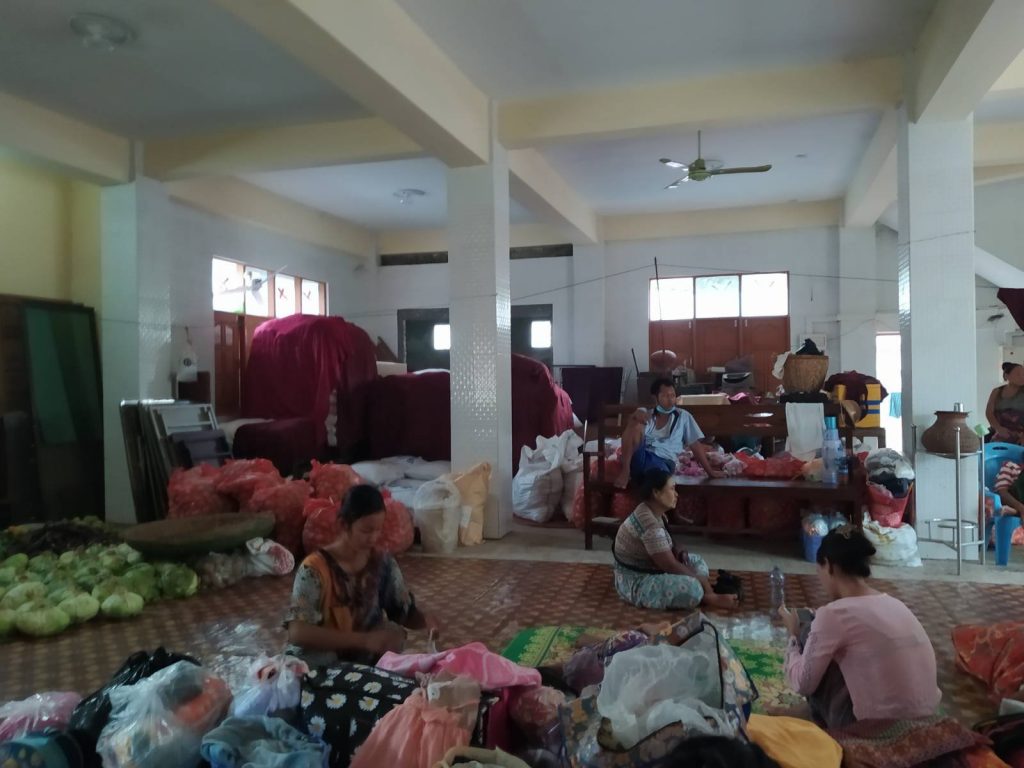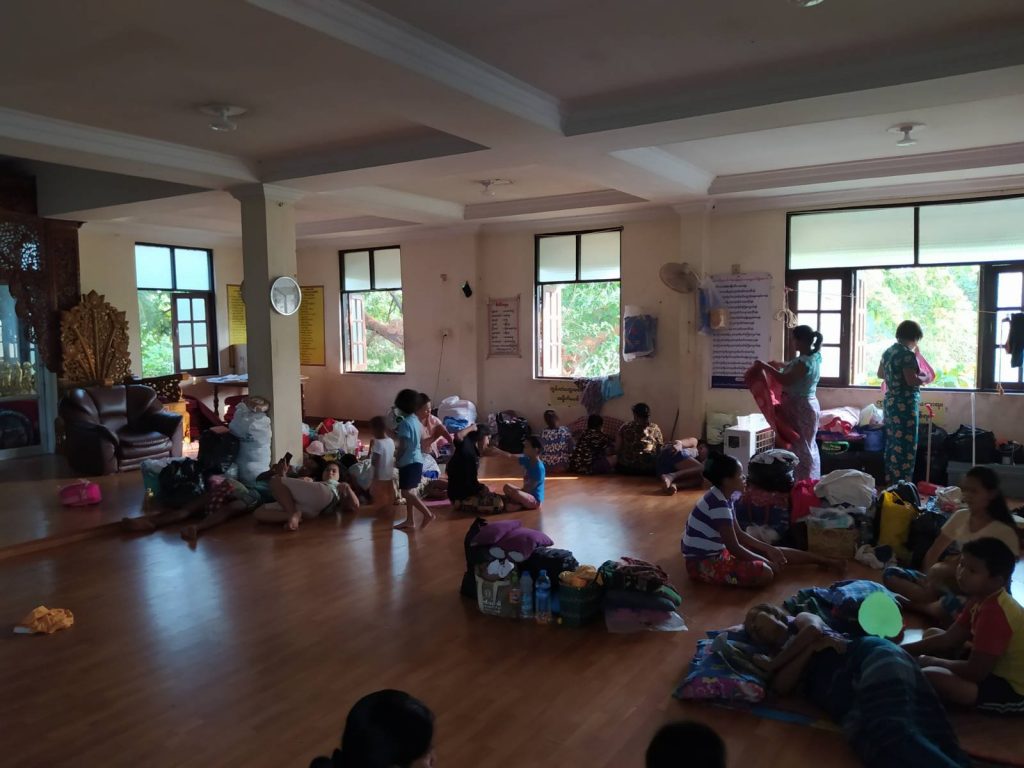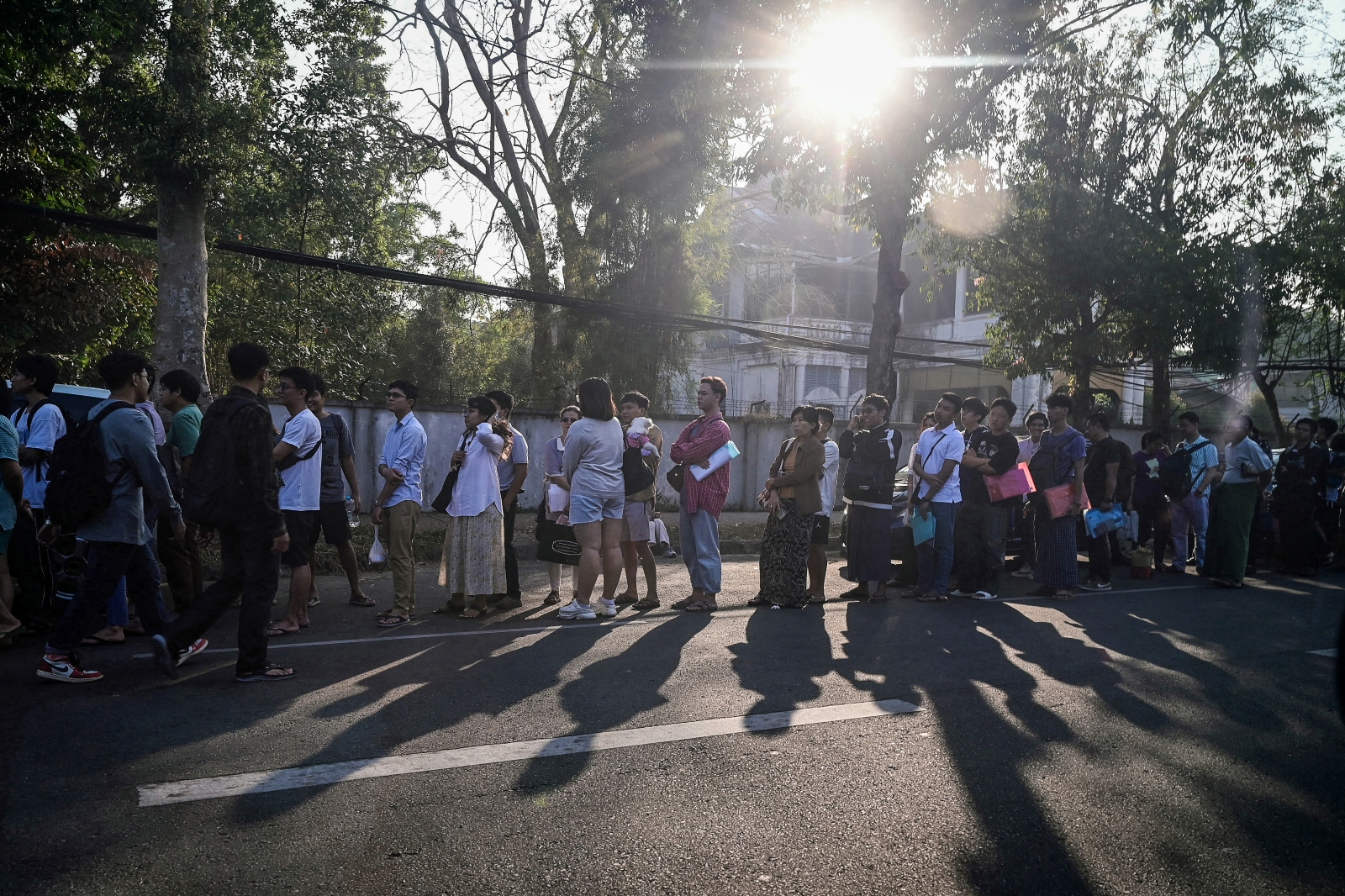Frustrated by the disruptive success of the Civil Disobedience Movement, the military regime has resorted to legal threats and forced evictions in an attempt to coerce striking civil servants back to work – but it doesn’t seem to be working.
By FRONTIER
Just a handful of striking Myanma Railways employees remain at the staff housing complex next to the Ma Hlwa Gone rail station, on the border of Yangon’s Tarmwe and Mingalar Taung Nyunt townships.
In a dawn raid on March 10, about 200 police and soldiers swarmed the residential compound, blocking off all exits and entrances in what many residents feared was the start of a mass arrest, or worse.
Instead, by noon authorities had ordered any residents still taking part in the Civil Disobedience Movement to abandon their homes within three hours. Hundreds of residents packed whatever they could grab into large plastic bags and fled on foot.
A week later, one of the few who remained said soldiers have since taken up residence in many of the vacated homes.
“They’re staying where the staff lived and are cooking in their former kitchens. They act like they are at home. And they bully [those of us who’ve remained] with weapons,” he told Frontier on March 16.

He said authorities detained three train conductors the day of the raid and are still holding them and “[using them] to move soldiers and food supplies to conflict sites in other states and regions”.
Although state media has trumpeted the Tatmadaw’s ability to replace civil servants with its own officers – including to run the railway system – the source said this did not appear to be the case. “I guess none of the soldiers can drive a train,” he said.
A relative of one of the detained conductors told Frontier the three are being held incommunicado, but that their families have given food and clothing to police intermediaries, who say the items will be passed on to their detained relatives.
‘No one wants to work under them’
The March 10 evictions and detentions were the first in what proved to be a more wide-spread tactic to pressure striking staff back to work. Two nights later, authorities stormed the staff quarters at the Insein rail station, in the north of the city, threatening residents there with eviction as well.
Resident and rail worker Ko Myint Aung told Frontier they detained two of his neighbours that night for having joined the CDM and as of March 24 they had still not been released or charged. Unlike at Ma Hlwa Gone, however, many workers still remain in Insein and continue to strike, he said.
But rail workers are not the only civil servants facing such pressure.
A female doctor who lives in staff housing at the University of Medicine 2, in Yangon’s North Okkalapa Township, was detained at her home the same night that authorities stormed the Insein compound. Police also raided the home of the local ward administrator, who is said to be heavily involved in the CDM.
The next night, on March 13, soldiers and police evicted striking doctors and nurses from staff housing connected to Myitkyina General Hospital in the Kachin State capital.
On March 14, in Taunggyi, the Shan State capital, the families of staff at the city’s Women and Children Hospital were thrown out of their staff housing, too.
State media have published daily threats of “legal action” against civil servants taking part in the CDM, printed in the Global New Light of Myanmar and broadcast over the 8pm nightly newscast on MRTV alongside promises of legal and physical protection for those who choose to return to work.
Neither the threats and evictions nor the enticements of protection seem to be working, however. Private sector workers in key industries are also continuing to strike, leaving banks, hospitals, rail lines, ports and more shuttered. Evicted health workers in Myitkyina and Taunggyi told Frontier they’ve had no trouble relocating, and that none of their colleagues in the CDM have returned to work.
The futility of the junta’s attempts were on stark display on March 16, when police erected a sign outside Mandalay General Hospital announcing its reopening the following day.
“But it was just a sign! There are no doctors there to treat patients, and no patients would go to seek treatment there,” a doctor at the hospital who has joined the CDM told Frontier. “The sign is make-believe. They’re pretending that doctors have returned, but they haven’t!
“There’s still no one working there, because no one wants to work under them [the military],” he added.
‘Nothing to lose’
Many of the residents booted in that first forced eviction, at the Ma Hlwa Gone station, are staying at nearby monasteries. More than 150 of them from about 70 families were sheltering in a monastery that Frontier visited on March 16.
“They can stay as long as they want. We’ve given the entire upstairs over for their use, but the conditions are very cramped and they aren’t able to cook hot meals,” said the monastery’s abbot.
He said donors have come and given generously to the workers – and that plainclothes police officers have also come by to ask about the donations.
“They wanted to know who was giving donations, and they wanted a list of the names of people staying here. We told them that we accept donations from anyone but take no names and keep no records. They did not come again,” he said.

Upstairs, attitudes about the future are split. Some striking rail workers, many of whom have migrated from other parts of the country, say they will return to their hometowns soon, though others plan to stay in the city “until the revolution is won”.
The Committee Representing Pyidaungsu Hluttaw, an NLD-led body that has appointed acting ministers while NLD leaders like State Counsellor Daw Aung San Suu Kyi are in detention, has promised to support striking workers and ensure they get their jobs back when the NLD returns to power. Underground, donation-based funding networks have also sprung up to support them.
Salaries for the jobs striking rail workers have walked out on range between about K120,000 and K200,000 (about $85 and $140) a month. “We have nothing more to lose,” said one. “What are our small jobs and scant salaries worth when our democracy has been stolen?”







